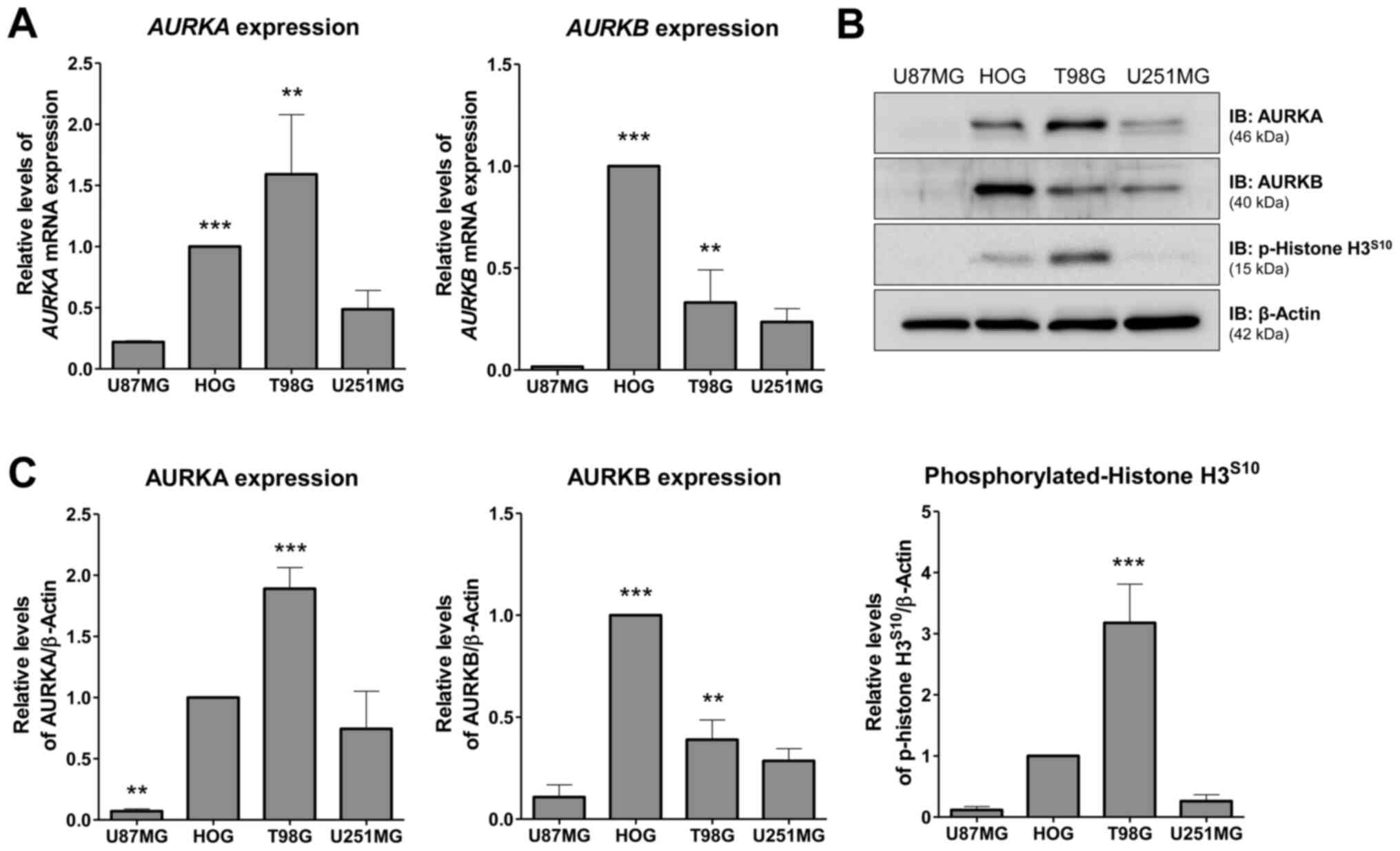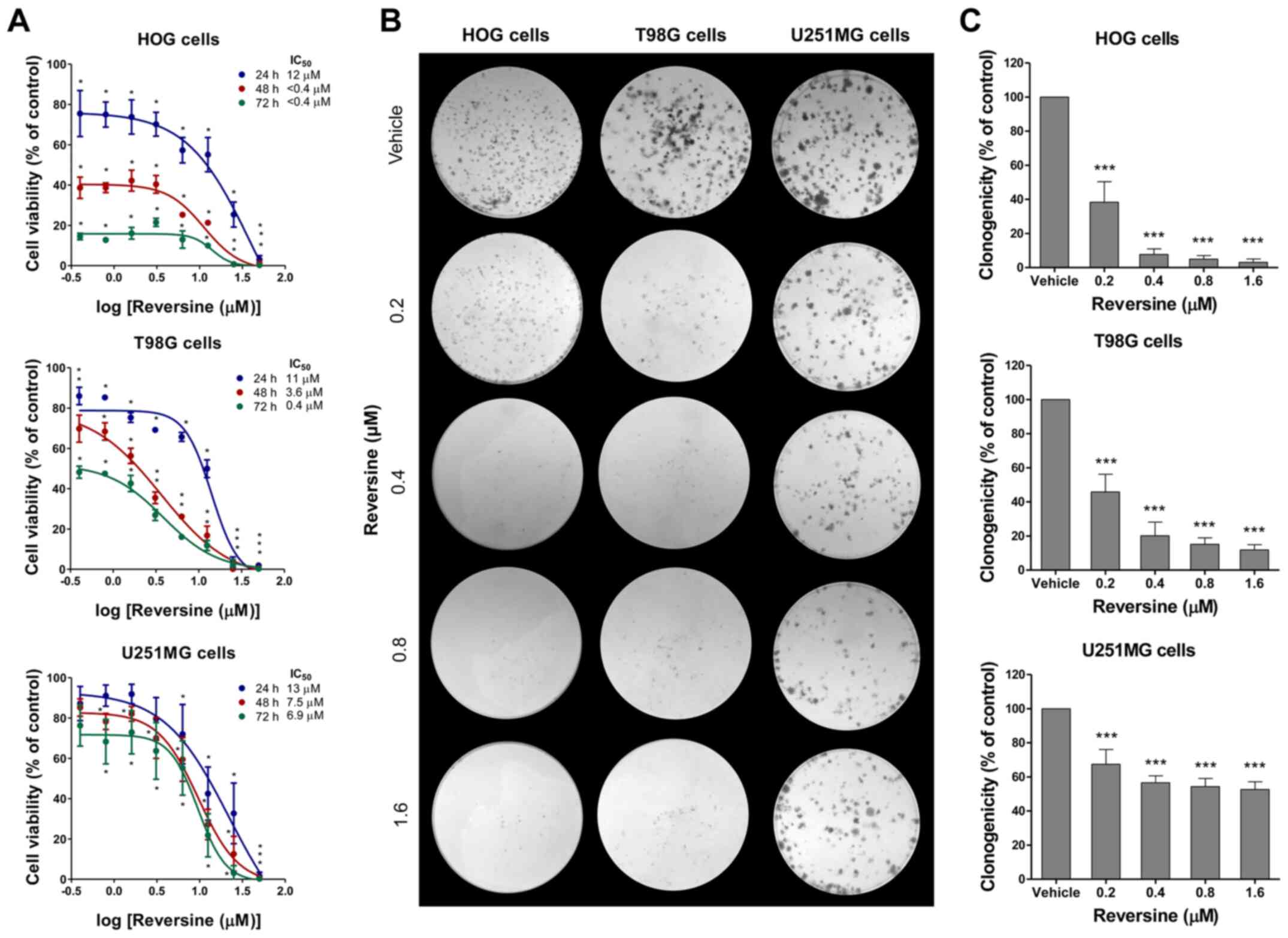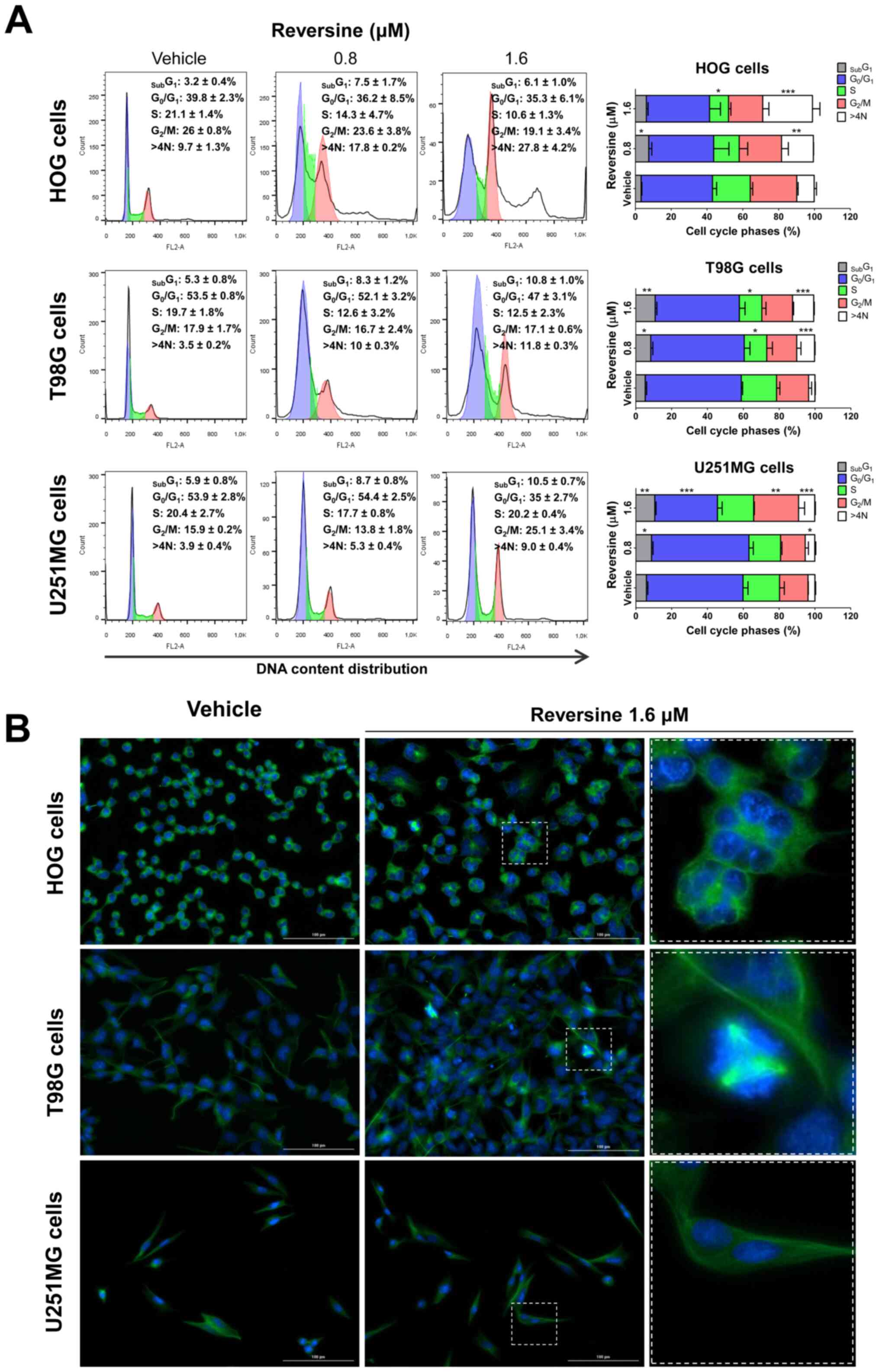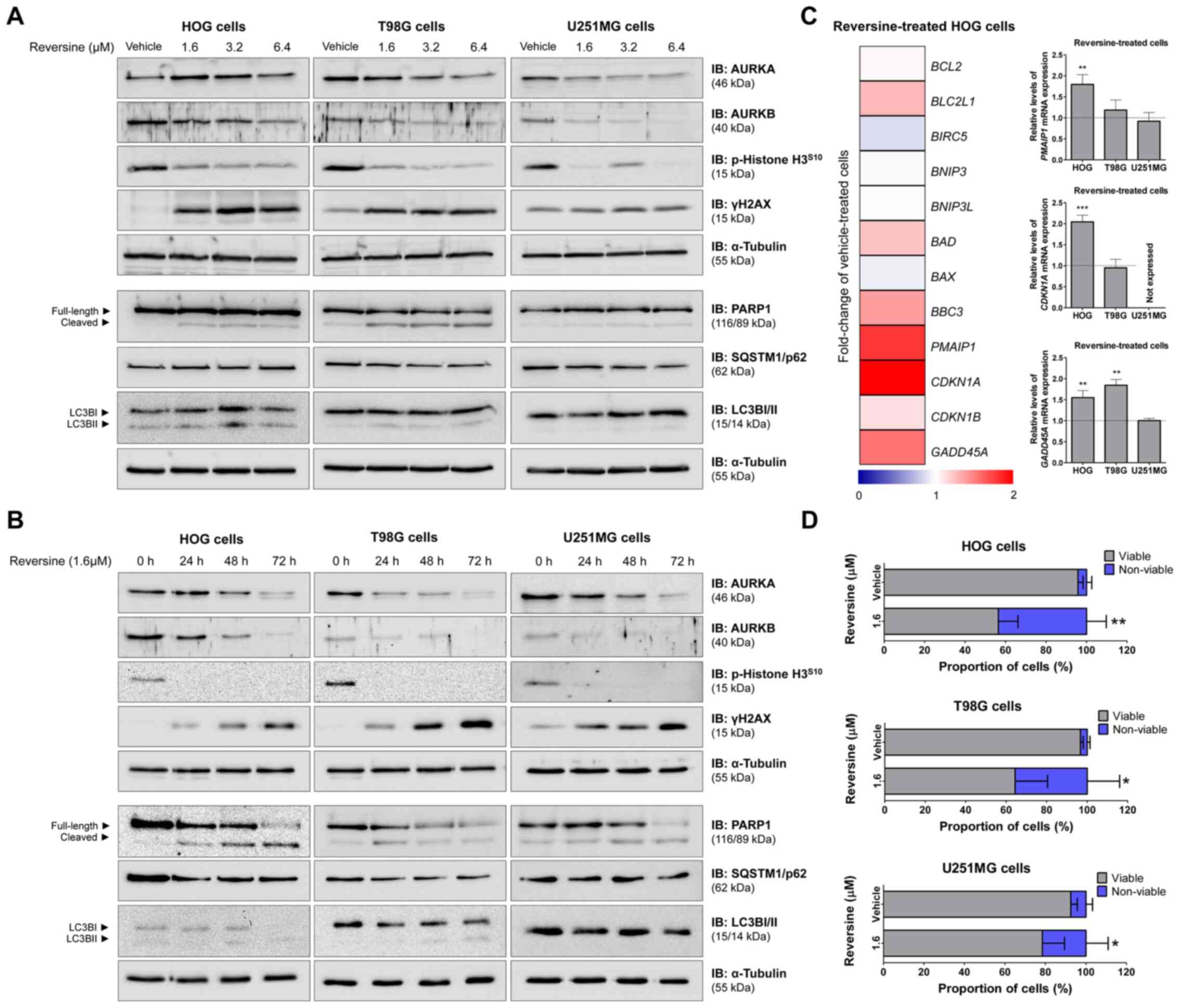|
1
|
Ostrom QT, Patil N, Cioffi G, Waite K,
Kruchko C and Barnholtz-Sloan JS: CBTRUS Statistical Report:
Primary Brain and Other Central Nervous System Tumors Diagnosed in
the United States in 2013–2017. Neuro Oncol. 22 (Suppl 2):iv1–iv96.
2020. View Article : Google Scholar : PubMed/NCBI
|
|
2
|
Louis DN, Perry A, Reifenberger G, von
Deimling A, Figarella-Branger D, Cavenee WK, Ohgaki H, Wiestler OD,
Kleihues P and Ellison DW: The 2016 World Health Organization
Classification of Tumors of the Central Nervous System: A summary.
Acta Neuropathol. 131:803–820. 2016. View Article : Google Scholar : PubMed/NCBI
|
|
3
|
Straube C, Schmidt-Graf F, Wiestler B,
Zimmer C, Meyer B and Combs SE: The algorithms of adjuvant therapy
in gliomas and their effect on survival. J Neurosurg Sci.
63:179–186. 2019. View Article : Google Scholar : PubMed/NCBI
|
|
4
|
Goldbrunner R, Ruge M, Kocher M, Lucas CW,
Galldiks N and Grau S: The Treatment of Gliomas in Adulthood. Dtsch
Arztebl Int. 115:356–364. 2018.PubMed/NCBI
|
|
5
|
Gittleman H, Boscia A, Ostrom QT, Truitt
G, Fritz Y, Kruchko C and Barnholtz-Sloan JS: Survivorship in
adults with malignant brain and other central nervous system tumor
from 2000–2014. Neuro Oncol. 20 (Suppl 7):vii6–vii16. 2018.
View Article : Google Scholar : PubMed/NCBI
|
|
6
|
Brennan CW, Verhaak RG, McKenna A, Campos
B, Noushmehr H, Salama SR, Zheng S, Chakravarty D, Sanborn JZ,
Berman SH, et al TCGA Research Network, : The somatic genomic
landscape of glioblastoma. Cell. 155:462–477. 2013. View Article : Google Scholar : PubMed/NCBI
|
|
7
|
Stupp R, Mason WP, van den Bent MJ, Weller
M, Fisher B, Taphoorn MJ, Belanger K, Brandes AA, Marosi C, Bogdahn
U, et al European Organisation for Research and Treatment of Cancer
Brain Tumor and Radiotherapy Groups: National Cancer Institute of
Canada Clinical Trials Group, : Radiotherapy plus concomitant and
adjuvant temozolomide for glioblastoma. N Engl J Med. 352:987–996.
2005. View Article : Google Scholar : PubMed/NCBI
|
|
8
|
Ali MY, Oliva CR, Noman ASM, Allen BG,
Goswami PC, Zakharia Y, Monga V, Spitz DR, Buatti JM and Griguer
CE: Radioresistance in Glioblastoma and the Development of
Radiosensitizers. Cancers (Basel). 12:122020. View Article : Google Scholar
|
|
9
|
Gilbert MR, Dignam JJ, Armstrong TS, Wefel
JS, Blumenthal DT, Vogelbaum MA, Colman H, Chakravarti A, Pugh S,
Won M, et al: A randomized trial of bevacizumab for newly diagnosed
glioblastoma. N Engl J Med. 370:699–708. 2014. View Article : Google Scholar : PubMed/NCBI
|
|
10
|
Fisher JP and Adamson DC: Current
FDA-approved therapies for high-grade malignant Gliomas.
Biomedicines. 9:92021. View Article : Google Scholar : PubMed/NCBI
|
|
11
|
Brat DJ, Verhaak RG, Aldape KD, Yung WK,
Salama SR, Cooper LA, Rheinbay E, Miller CR, Vitucci M, Morozova O,
et al Cancer Genome Atlas Research Network, : Comprehensive,
integrative genomic analysis of diffuse lower-grade gliomas. N Engl
J Med. 372:2481–2498. 2015. View Article : Google Scholar : PubMed/NCBI
|
|
12
|
Huang D, Huang Y, Huang Z, Weng J, Zhang S
and Gu W: Relation of AURKB over-expression to low survival rate in
BCRA and reversine-modulated aurora B kinase in breast cancer cell
lines. Cancer Cell Int. 19:1662019. View Article : Google Scholar : PubMed/NCBI
|
|
13
|
Song HK, Noh EM, Kim JM, You YO, Kwon KB
and Lee YR: Reversine inhibits MMP-3, IL-6 and IL-8 expression
through suppression of ROS and JNK/AP-1 activation in
interleukin-1β-stimulated human gingival fibroblasts. Arch Oral
Biol. 108:1045302019. View Article : Google Scholar : PubMed/NCBI
|
|
14
|
Jemaà M, Abassi Y, Kifagi C, Fezai M,
Daams R, Lang F and Massoumi R: Reversine inhibits Colon Carcinoma
Cell Migration by Targeting JNK1. Sci Rep. 8:118212018. View Article : Google Scholar
|
|
15
|
Piccoli M, Ghiroldi A, Monasky MM, Cirillo
F, Ciconte G, Pappone C and Anastasia L: Reversine: A synthetic
purine with a dual activity as a cell dedifferentiating agent and a
selective anticancer drug. Curr Med Chem. 27:3448–3462. 2020.
View Article : Google Scholar : PubMed/NCBI
|
|
16
|
Willems E, Dedobbeleer M, Digregorio M,
Lombard A, Lumapat PN and Rogister B: The functional diversity of
Aurora kinases: A comprehensive review. Cell Div. 13:72018.
View Article : Google Scholar : PubMed/NCBI
|
|
17
|
Diekema DS: Is taller really better?
Growth hormone therapy in short children. Perspect Biol Med.
34:109–123. 1990. View Article : Google Scholar : PubMed/NCBI
|
|
18
|
Alafate W, Wang M, Zuo J, Wu W, Sun L, Liu
C, Xie W and Wang J: Targeting Aurora kinase B attenuates
chemoresistance in glioblastoma via a synergistic manner with
temozolomide. Pathol Res Pract. 215:1526172019. View Article : Google Scholar : PubMed/NCBI
|
|
19
|
Tang A, Gao K, Chu L, Zhang R, Yang J and
Zheng J: Aurora kinases: Novel therapy targets in cancers.
Oncotarget. 8:23937–23954. 2017. View Article : Google Scholar : PubMed/NCBI
|
|
20
|
Marumoto T, Zhang D and Saya H: Aurora-A -
a guardian of poles. Nat Rev Cancer. 5:42–50. 2005. View Article : Google Scholar : PubMed/NCBI
|
|
21
|
Steigemann P, Wurzenberger C, Schmitz MH,
Held M, Guizetti J, Maar S and Gerlich DW: Aurora B-mediated
abscission checkpoint protects against tetraploidization. Cell.
136:473–484. 2009. View Article : Google Scholar : PubMed/NCBI
|
|
22
|
Pérez Fidalgo JA, Roda D, Roselló S,
Rodríguez-Braun E and Cervantes A: Aurora kinase inhibitors: A new
class of drugs targeting the regulatory mitotic system. Clin Transl
Oncol. 11:787–798. 2009. View Article : Google Scholar
|
|
23
|
Libertini S, Abagnale A, Passaro C, Botta
G and Portella G: Aurora A and B kinases - targets of novel
anticancer drugs. Recent Patents Anticancer Drug Discov. 5:219–241.
2010. View Article : Google Scholar : PubMed/NCBI
|
|
24
|
Borisa AC and Bhatt HG: A comprehensive
review on Aurora kinase: Small molecule inhibitors and clinical
trial studies. Eur J Med Chem. 140:1–19. 2017. View Article : Google Scholar : PubMed/NCBI
|
|
25
|
Lehman NL, O'Donnell JP, Whiteley LJ,
Stapp RT, Lehman TD, Roszka KM, Schultz LR, Williams CJ, Mikkelsen
T, Brown SL, et al: Aurora A is differentially expressed in
gliomas, is associated with patient survival in glioblastoma and is
a potential chemotherapeutic target in gliomas. Cell Cycle.
11:489–502. 2012. View Article : Google Scholar : PubMed/NCBI
|
|
26
|
Livak KJ and Schmittgen TD: Analysis of
relative gene expression data using real-time quantitative PCR and
the 2(-Delta Delta C(T)) method. Methods. 25:402–408. 2001.
View Article : Google Scholar : PubMed/NCBI
|
|
27
|
Saeed AI, Sharov V, White J, Li J, Liang
W, Bhagabati N, Braisted J, Klapa M, Currier T, Thiagarajan M, et
al: TM4: A free, open-source system for microarray data management
and analysis. Biotechniques. 34:374–378. 2003. View Article : Google Scholar : PubMed/NCBI
|
|
28
|
Lima K, Carlos JAEG, Alves-Paiva RM,
Vicari HP, Souza Santos FP, Hamerschlak N, Costa-Lotufo LV, Traina
F and Machado-Neto JA: Reversine exhibits antineoplastic activity
in JAK2V617F-positive myeloproliferative neoplasms. Sci Rep.
9:98952019. View Article : Google Scholar : PubMed/NCBI
|
|
29
|
Hama S, Matsuura S, Tauchi H, Yamasaki F,
Kajiwara Y, Arita K, Yoshioka H, Heike Y, Mandai K and Kurisu K:
p16 Gene transfer increases cell killing with abnormal nucleation
after ionising radiation in glioma cells. Br J Cancer.
89:1802–1811. 2003. View Article : Google Scholar : PubMed/NCBI
|
|
30
|
Van Noorden CJ: The history of Z-VAD-FMK,
a tool for understanding the significance of caspase inhibition.
Acta Histochem. 103:241–251. 2001. View Article : Google Scholar : PubMed/NCBI
|
|
31
|
Souers AJ, Leverson JD, Boghaert ER,
Ackler SL, Catron ND, Chen J, Dayton BD, Ding H, Enschede SH,
Fairbrother WJ, et al: ABT-199, a potent and selective BCL-2
inhibitor, achieves antitumor activity while sparing platelets. Nat
Med. 19:202–208. 2013. View Article : Google Scholar : PubMed/NCBI
|
|
32
|
Nguyen M, Marcellus RC, Roulston A, Watson
M, Serfass L, Murthy Madiraju SR, Goulet D, Viallet J, Bélec L,
Billot X, et al: Small molecule obatoclax (GX15-070) antagonizes
MCL-1 and overcomes MCL-1-mediated resistance to apoptosis. Proc
Natl Acad Sci USA. 104:19512–19517. 2007. View Article : Google Scholar : PubMed/NCBI
|
|
33
|
D'Alise AM, Amabile G, Iovino M, Di
Giorgio FP, Bartiromo M, Sessa F, Villa F, Musacchio A and Cortese
R: Reversine, a novel Aurora kinases inhibitor, inhibits colony
formation of human acute myeloid leukemia cells. Mol Cancer Ther.
7:1140–1149. 2008. View Article : Google Scholar
|
|
34
|
Rodrigues Alves AP, Machado-Neto JA,
Scheucher PS, Paiva HH, Simões BP, Rego EM and Traina F: Reversine
triggers mitotic catastrophe and apoptosis in K562 cells. Leuk Res.
48:26–31. 2016. View Article : Google Scholar : PubMed/NCBI
|
|
35
|
Carlos J, Lima K, Coelho-Silva JL, de Melo
Alves-Paiva R, Moreno NC, Vicari HP, de Souza Santos FP,
Hamerschlak N, Costa-Lotufo LV, Traina F, et al: Reversine exerts
cytotoxic effects through multiple cell death mechanisms in acute
lymphoblastic leukemia. Cell Oncol (Dordr). 43:1191–1201. 2020.
View Article : Google Scholar : PubMed/NCBI
|
|
36
|
Lee YR, Wu WC, Ji WT, Chen JY, Cheng YP,
Chiang MK and Chen HR: Reversine suppresses oral squamous cell
carcinoma via cell cycle arrest and concomitantly apoptosis and
autophagy. J Biomed Sci. 19:92012. View Article : Google Scholar : PubMed/NCBI
|
|
37
|
Hua SC, Chang TC, Chen HR, Lu CH, Liu YW,
Chen SH, Yu HI, Chang YP and Lee YR: Reversine, a 2,6-disubstituted
purine, as an anti-cancer agent in differentiated and
undifferentiated thyroid cancer cells. Pharm Res. 29:1990–2005.
2012. View Article : Google Scholar : PubMed/NCBI
|
|
38
|
Lu CH, Liu YW, Hua SC, Yu HI, Chang YP and
Lee YR: Autophagy induction of reversine on human follicular
thyroid cancer cells. Biomed Pharmacother. 66:642–647. 2012.
View Article : Google Scholar : PubMed/NCBI
|
|
39
|
Kuo CH, Lu YC, Tseng YS, Shi CS, Chen SH,
Chen PT, Wu FL, Chang YP and Lee YR: Reversine induces cell cycle
arrest, polyploidy, and apoptosis in human breast cancer cells.
Breast Cancer. 21:358–369. 2014. View Article : Google Scholar : PubMed/NCBI
|
|
40
|
Qin HX, Yang J, Cui HK, Li SP, Zhang W,
Ding XL and Xia YH: Synergistic antitumor activity of reversine
combined with aspirin in cervical carcinoma in vitro and in vivo.
Cytotechnology. 65:643–653. 2013. View Article : Google Scholar : PubMed/NCBI
|
|
41
|
Lu YC, Lee YR, Liao JD, Lin CY, Chen YY,
Chen PT and Tseng YS: Reversine induced multinucleated cells, cell
apoptosis and autophagy in human non-small cell lung cancer cells.
PLoS One. 11:e01585872016. View Article : Google Scholar : PubMed/NCBI
|
|
42
|
Fang CY, Chen JS, Chang SK and Shen CH:
Reversine induces autophagic cell death through the AMP-activated
protein kinase pathway in urothelial carcinoma cells. Anticancer
Drugs. 29:29–39. 2018. View Article : Google Scholar : PubMed/NCBI
|
|
43
|
Cheng L, Wang H, Guo K, Wang Z, Zhang Z,
Shen C, Chen L and Lin J: Reversine, a substituted purine, exerts
an inhibitive effect on human renal carcinoma cells via induction
of cell apoptosis and polyploidy. OncoTargets Ther. 11:1025–1035.
2018. View Article : Google Scholar : PubMed/NCBI
|
|
44
|
Park YL, Ha SY, Park SY, Choi JH, Jung MW,
Myung DS, Kim HS and Joo YE: Reversine induces cell cycle arrest
and apoptosis via upregulation of the Fas and DR5 signaling
pathways in human colorectal cancer cells. Int J Oncol.
54:1875–1883. 2019.PubMed/NCBI
|
|
45
|
Kim JS, Cho IA, Kang KR, Lim H, Kim TH, Yu
SK, Kim HJ, Lee SA, Moon SM, Chun HS, et al: Reversine induces
caspase-dependent apoptosis of human osteosarcoma cells through
extrinsic and intrinsic apoptotic signaling pathways. Genes
Genomics. 41:657–665. 2019. View Article : Google Scholar : PubMed/NCBI
|
|
46
|
Hiruma Y, Koch A, Dharadhar S, Joosten RP
and Perrakis A: Structural basis of reversine selectivity in
inhibiting Mps1 more potently than aurora B kinase. Proteins.
84:1761–1766. 2016. View Article : Google Scholar : PubMed/NCBI
|
|
47
|
Li N, Maly DJ, Chanthery YH, Sirkis DW,
Nakamura JL, Berger MS, James CD, Shokat KM, Weiss WA and Persson
AI: Radiotherapy followed by aurora kinase inhibition targets
tumor-propagating cells in human glioblastoma. Mol Cancer Ther.
14:419–428. 2015. View Article : Google Scholar : PubMed/NCBI
|
|
48
|
Hong X, O'Donnell JP, Salazar CR, Van
Brocklyn JR, Barnett KD, Pearl DK, deCarvalho AC, Ecsedy JA, Brown
SL, Mikkelsen T, et al: The selective Aurora-A kinase inhibitor
MLN8237 (alisertib) potently inhibits proliferation of glioblastoma
neurosphere tumor stem-like cells and potentiates the effects of
temozolomide and ionizing radiation. Cancer Chemother Pharmacol.
73:983–990. 2014.PubMed/NCBI
|
|
49
|
Galluzzi L, Pietrocola F, Bravo-San Pedro
JM, Amaravadi RK, Baehrecke EH, Cecconi F, Codogno P, Debnath J,
Gewirtz DA, Karantza V, et al: Autophagy in malignant
transformation and cancer progression. EMBO J. 34:856–880. 2015.
View Article : Google Scholar : PubMed/NCBI
|
|
50
|
Xiao BD, Zhao YJ, Jia XY, Wu J, Wang YG
and Huang F: Multifaceted p21 in carcinogenesis, stemness of tumor
and tumor therapy. World J Stem Cells. 12:481–487. 2020. View Article : Google Scholar : PubMed/NCBI
|
|
51
|
Salvador JM, Brown-Clay JD and Fornace AJ
Jr: Gadd45 in stress signaling, cell cycle control, and apoptosis.
Adv Exp Med Biol. 793:1–19. 2013. View Article : Google Scholar : PubMed/NCBI
|
|
52
|
Liebermann DA, Tront JS, Sha X, Mukherjee
K, Mohamed-Hadley A and Hoffman B: Gadd45 stress sensors in
malignancy and leukemia. Crit Rev Oncog. 16:129–140. 2011.
View Article : Google Scholar : PubMed/NCBI
|
|
53
|
Morsi RZ, Hage-Sleiman R, Kobeissy H and
Dbaibo G: Noxa: Role in cancer pathogenesis and treatment. Curr
Cancer Drug Targets. 18:914–928. 2018. View Article : Google Scholar : PubMed/NCBI
|


















